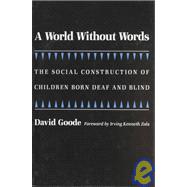A World Without Words
, by Goode, David- ISBN: 9781566392167 | 1566392160
- Cover: Paperback
- Copyright: 6/29/1994
During the Rubella Syndrome epidemic of the 1960s, many children were born deaf, blind, and mentally disabled. David Goode has devoted his life and career to understanding such people's world, a world without words, but not, the author confirms, one without communication. This book is the result of his studies of two children with congenital deaf-blindness and mental retardation.Goode spent countless hours observing, teaching, and playing with Christina, who had been institutionalized since age six, and Bianca, who remained in the care of her parents. He also observed the girls' parents, school, and medical environments, exploring the unique communication practices-sometimes so subtle they are imperceptible to outsiders-that family and health care workers create to facilitate innumerable every day situations.A World Without Wordspresents moving and convincing evidence that human beings both with and without formal language can understand and communicate with each other in many ways.Through various experiments in such unconventional forms of communication as playing guitar, mimicking, and body movements like jumping, swinging, and rocking, Goode established an understanding of these children on their own terms. He discovered a spectrum of non-formal language through which these children create their own set of symbols within their own reality, and accommodate and maximize the sensory resources they do have. Ultimately, he suggests, it is impractical to attempt to interpret these children's behaviors using ideas about normal behavior of the hearing and seeing world. Author note:David Goodeis the Coordinator of the Program in Developmental Disabilities and teaches sociology at the College of Staten Island, City University of New York.






